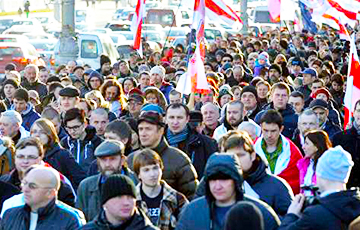How Belarusian "Parasites" Resist Lukashenka's Decree
28- 15.02.2019, 8:52
- 41,185

The new decree wil falter as well as the previous one.
Residents of Belarus, "not employed in the economy," will soon have to pay for public utilities at a higher rate, German Wave writes.
Lukashenka's decree № 1 on employment promotion, which replaced scandalous decree № 3, called "parasite" and triggered a wave of protests, provides for changes. Using these measures, the government tries to force Belarusians to work at state-owned enterprises, where wages often barely allow them to make ends meet.
Initially, from January 1, 2019 the new decree provided for deprivation of the right to state subsidies for public utilities for the unemployed - so far it concerns only hot water supply. They will have to pay in full. But then the decree was postponed until March. The country hopes that the new law will falter like the previous one.
Unconstitutional decree
Four years ago, when the authorities first announced the idea of not-employed charges, Homel human rights activist Leanid Sudalenka urged Belarusians to ignore requirements of the decree of Aliaksandr Lukashenka and bring cases to court. Today, his position has not changed: complaints he helps to draw up for citizens objecting to the implementation of Decree No. 1, refer to its non-conformity with the Constitution, and include a requirement through the pre-trial process to exclude information about complainants from the database, which lists the "unemployed in the economy".
If it comes to court, Sudalenka explains, the main argument is simple: every citizen pays VAT when consuming services and buying goods, and therefore participates in the economy of the country. According to the lawyer, the authorities are trying to force people to seek a job, thus violating their constitutional rights. "Unemployed in the economy" is not a legal term at all," Leanid Sudalenka states.
The tactics proposed by the human rights activist is fruitful, Uladzimir Tseremetski, 52, a resident of the district center Brahin, says. A month ago, an employee of the district executive committee personally brought him a warning of the local "parasite commission". After that Tseremetski immediately filed a complaint to the regional superior authorities.
A few weeks later, he says, local officials found documents about his part-time farming and removed him from the list of "parasites" saying "producer of crop and livestock products on his land plot".
After the accident at the Chernobyl NPP, the majority of the population was resettled from Brahin, and now there are only about three thousand people left. All "Chernobyl" benefits have long been canceled, it's almost impossible to find a job in the village, while the pressure on the unemployed is increasing, Uladzimir Tseremetski says. The man was seriously offended by the fact that he was called a parasite, although that status did not pose any threat to him: he has no hot water supply in his apartment, only a gas stove.
Tariff ratess increase influences hot water supply followed by gas and heating
Tariff rates for hot water for "parasites" may increase fourfold, Homel resident Andrei Kulitski says. The man had the phone call and was informed about the inclusion of "not employed in the economy" database; no official notification from the "parasite commission" was sent.
Being the owner, the greatest concern of Andrei Kulitski is gas and heating tariff rates increase for "parasites in September. If today, the interlocutor DW explains, he pays about Br130 per month for an apartment (about €53 in equivalent), from September chargers may go up to Br300. Some people have such a salary in Homel, he adds.
For a long time Andrey Kulitsky worked in the north of Russia. In Homel, he says, it is not possible to find a job with decent wages. Sometimes you have to go to Russia to earn money. Kulitsky is not going to obey the new law. "Why do I need an apartment with my salary of 300 rubles? It's easier to sell it and leave the country," he says.
No place for housewives in Belarus?
Human rights activist Leanid Sudalenka believes that Lukashenka's decree is unimplementable, since it stalls at the first stage - an increase of tariff rates for hot water supply. If an unemployed owner lives in an apartment, it is clear what to do with him, the lawyer says. But what should one do if there are other working family members live in the apartment? After all, there is only one water meter. In such cases, the housing and utilities service is helpless, Sudalenka believes. Trying to solve these issues, the authorities have postponed the introduction of new tariffs for public utilities for "parasites" from January to March, and it may be not the final date, the interlocutor of DW believes.
Despite the fact that the new utility tariffs have not yet been adopted for "parasites", the first trial will be held in Belarus next month, which attempts to prove the illegality of Lukashenka's decree. The lawsuit is filed by Maria Tarasenko from Homel; she owns an apartment and, as she says, is a housewife with ten-year experience.
The woman worked for more than ten years in a Homel factory, first as a seamstress and then as a foreman. Working conditions were so tough, that she and her husband decided his salary would be enough for two.
Maria was outraged by a phone call from the house administration, which warned her about registration her as a "parasite". She considered it an intrusion upon seclusion . The Marriage and Family Code, DW's interlocutor says, classifies household management as socially useful work. Maria does not intend to register as a "fake individual entrepreneur". She will therefore fight against the decree in court.








